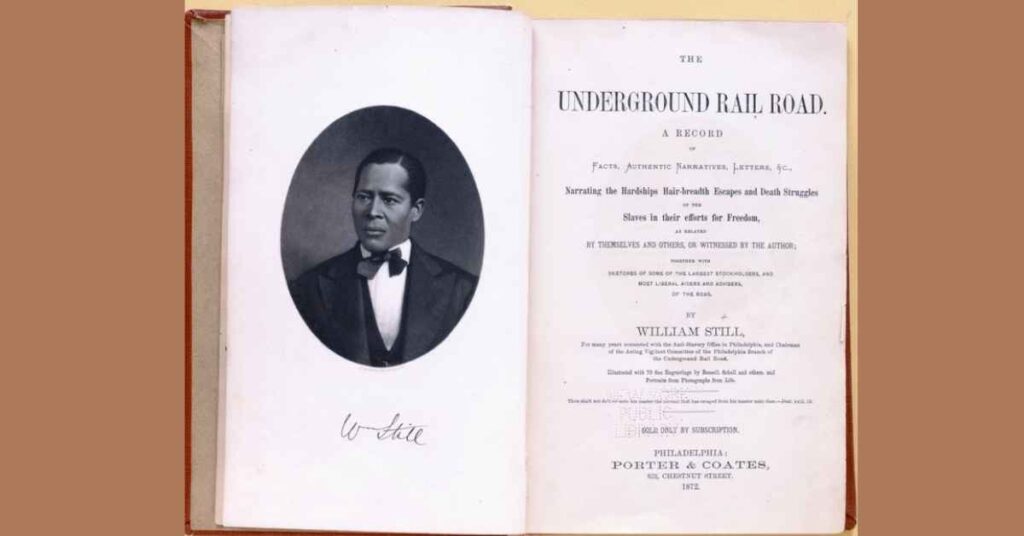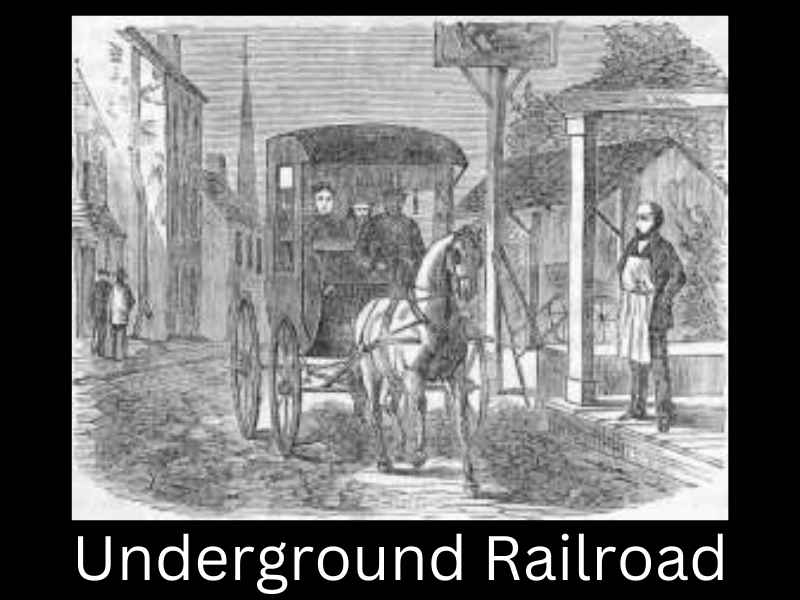This excerpt from “The Underground Railroad” documents the escape of David who “borrowed” his master’s horse and was helped by a friend who hired a carriage.
This escape astonished the helping committee who received David and his companions in Philadelphia. David was aided by a white woman and a ten-year-old child. It was this woman who hied the coach to aid David in his scheme.
David posed as the coachman driving his white lady owner and her child from Leesburg, Virginia, to Pennsylvania.
This fascinating account raises so many other questions. Thankfully, the committee calmly accepted the entire party as fugitives to be assisted on their way.
About The Book
“The Underground Railroad” was published in 1872. The book gives the testimonies of hundreds of slaves who escaped to freedom using the network of agents and safe houses.
The author, William Still, was a black abolitionist and businessman who was a key member of the Philadelphia stop in the freedom network.
The book is in the public domain. It can be found in the Library of Congress.

Excerpt – Escape By Horse And Carriage
[The headings and text in brackets was added by the website editor. The rest is verbatim from the book.]
[A second group on this particular day] reached the Committee.
It consisted of a colored man, a white woman and a child, ten years old. This case created no little surprise.
Not that quite a number of passengers, fair enough to pass for white, with just a slight tinge of colored blood in their veins, even sons and daughters of some of the F.F.V. [owners], had not on various occasions come over the U.G.R.R [Underground Rail Road].
But this party was peculiar.
An explanation was sought, which resulted in ascertaining that the party was from Leesburg, Virginia; that David, the colored man, was about twenty-seven years of age, intelligent, and was owned, or claimed by Joshua Pusey.
David had no taste for Slavery, indeed, felt that it would be impossible for him to adapt himself to a life of servitude for the special benefit of others; he had, already, as he thought, been dealt with very wrongfully by Pusey, who had deprived him of many years of the best part of his life, and would continue thus to wrong him, if he did not make a resolute effort to get away.
So after thinking of various plans, he determined not to run off as a slave with his “budget on his back,” but to “travel as a coachman,” under the “protection of a white lady.”
In planning this pleasant scheme, David was not blind to the fact that neither himself nor the “white lady,” with whom he proposed to travel, possessed either horse or carriage.
Borrowing The Master’s Horse

But his master happened to have a vehicle that would answer for the occasion.
David reasoned that as Joshua, his so called master, had deprived him of his just dues for so many years, he had a right to borrow, or take without borrowing, one of Joshua’s horses for the expedition.
The plan was submitted to the lady, and was approved, and a mutual understanding here entered into, that she should hire a carriage, and take also her little girl with them.
The lady was to assume the proprietorship of the horse, carriage and coachman. In so doing all dangers would be, in their judgment, averted.
The scheme being all ready for execution, the time for departure was fixed, the carriage hired, David having secured his master Joshua’s horse, and off they started in the direction of Pennsylvania.
White people being so accustomed to riding, and colored people to driving, the party looked all right. No one suspected them, that they were aware of, while passing through Virginia.
Hiding In Plain Sight
On reaching Chambersburg, Pa., in the evening, they drove to a hotel, the lady alighted, holding by the hand her well dressed and nice-looking little daughter, bearing herself with as independent an air as if she had owned twenty such boys as accompanied her as coachman.
She did not hesitate to enter and request accommodations for the night, for herself, daughter, coachman, and horse.
Being politely told that they could be accommodated, all that was necessary was, that the lady should show off to the best advantage possible.
The same duty also rested with weight upon the mind of David.
Suspicion And Danger
The night passed safely and the morning was ushered in with bright hopes which were overcast but only for a moment, however.
Breakfast having been ordered and partaken of, to the lady’s surprise, just as she was in the act of paying the bill, the proprietor of the hotel intimated that he thought that matters “looked a little suspicious.”
In other words, he said plainly, that he “believed that it was an Underground Rail Road movement;” but being an obliging hotel-keeper, he assured her at the same time, that he “would not betray them.”
Just here it was with them as it would have been on any other rail road when things threaten to come to a stand; they could do nothing more than make their way out of the peril as best they could.
One thing they decided to do immediately, namely, to “leave the horse and carriage,” and try other modes of travel.
They concluded to take the regular passenger cars. In this way they reached Philadelphia.
In Harrisburg, they had sought and received instructions how to find the Committee in Philadelphia.
The Committee Does Not Inquire Too Closely
What relations had previously existed between David and this lady in Virginia, the Committee knew not.
It looked more like the time spoken of in Isaiah, where it is said, “And a little child shall lead them,” than any thing that had ever been previously witnessed on the Underground Rail Road.
The Underground Rail Road never practised the proscription governing other roads, on account of race, color, or previous condition.
All were welcome to its immunities, white or colored, when the object to be gained favored freedom, or weakened Slavery.
As the sole aim apparent in this case was freedom for the slave the Committee received these travellers as Underground Rail Road passengers.